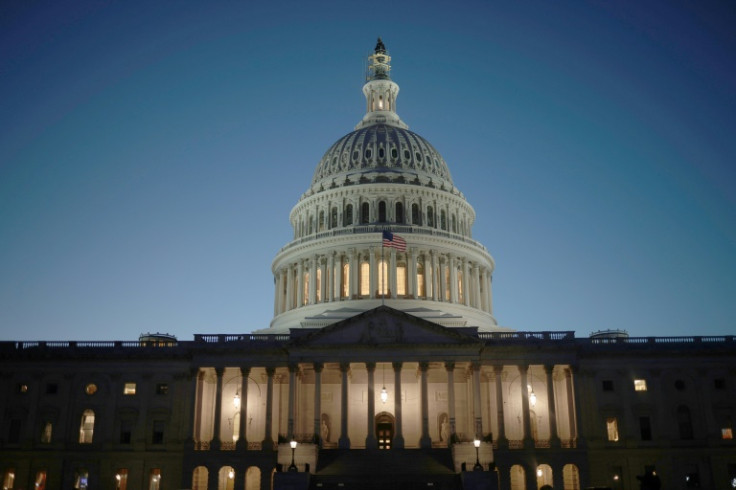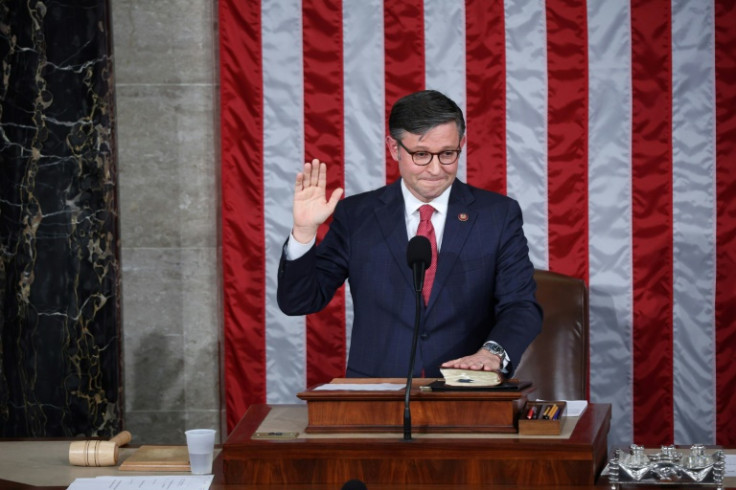US House Passes Government Funding, Sparking Republican Mutiny

A hard-right Republican launched a bid on Friday to oust US House Speaker Mike Johnson, reigniting an intra-party battle between traditional conservatives and firebrand supporters of Donald Trump that crippled Congress for months last year.
Marjorie Taylor Greene, a close ally of Trump, told reporters she had filed the "motion to vacate" over a government funding deal that Johnson endorsed and she described as a "betrayal."
The resolution, which requires a simple majority to pass, comes after the same move led to the removal of previous speaker Kevin McCarthy last fall -- and weeks of infighting as Republicans rejected several potential replacements before settling on Johnson.
"This is a betrayal of the American people, this is a betrayal of Republican voters," Georgia congresswoman Greene said after the House voted to approve a sprawling $1.2 trillion package to fund the government.
The spending fight came with both sides pushing their campaign messaging and priorities ahead of November's presidential election, when President Joe Biden faces Trump.
Greene called the legislation a "wish list" for Democrats but set no urgent timeline on Johnson's removal vote, calling it "more of a warning" and saying she was merely "starting the process" to elect a new speaker.
"I have respect for him as a person, but he is not doing the job," Greene said, indicating that lawmakers could vote on Johnson's future when they return from their Easter recess in two weeks.
Johnson angered conservatives by endorsing the bipartisan funding package, which completes the 2024 budget and kicks off a race against the clock in the Senate to ensure the lights stay on past a midnight deadline for a partial government shutdown.
Party leaders in the upper chamber were scrambling to agree on a sped-up timeline to green-light the legislation, with just hours left to stop several federal agencies, including defense and homeland security, from scaling back operations.
The legislation has already been delayed by six months in a Congress which is divided almost evenly between the parties, and has been deadlocked by disputes.
Party leaders fear the Senate may struggle to rubber-stamp the House vote before the midnight deadline, with arcane procedural rules threatening to push the action into the weekend.
The House Republicans' right flank was angered by a lack of stricter border security provisions in the package, as well as the spending figure and the elevated speed with which the deal has been negotiated.
A lapse in federal funding over Saturday and Sunday would have a limited impact on government operations and would not likely be felt by the public, as long as the spigot was turned back on at the start of the working week.
A longer pause could result in thousands of public employees being sent home without pay and an array of government operations and services being hit, from airport security to border controls.
Some public employees in the health sector received messages on Friday warning of a potential shutdown.
"This funding agreement between the White House and congressional leaders is good news that comes in the nick of time," Democratic Senate Majority Leader Chuck Schumer said on the floor of the upper chamber, putting a positive gloss on the chance of delays.
The first quarter of the budget -- six bills covering agriculture, science, veterans' programs, transport and housing -- passed without major drama last month.
Five of the six bills covering the rest of federal spending were straightforward, but disputes over the funding of homeland security delayed the release of the deal, originally expected last weekend.
Vote-counters had expected a couple of dozen Democratic dissenters in the House, including progressives upset about more than $3 billion in funding for Israel included in the package and cuts to UN funding for Gaza.
The Democratic opposition ended up amounting to around that figure, meaning the Republicans, who have a razor-thin majority, were required to contribute around 100 votes to achieve the two-thirds majority.
Although they achieved that benchmark, less than half of House Republicans supported the deal, boosting the case for Johnson's ouster.

© Copyright AFP {{Year}}. All rights reserved.





















